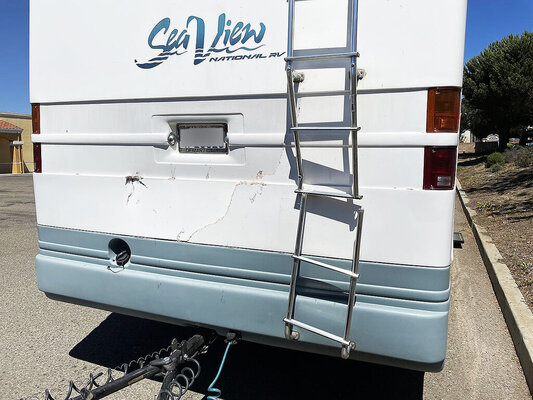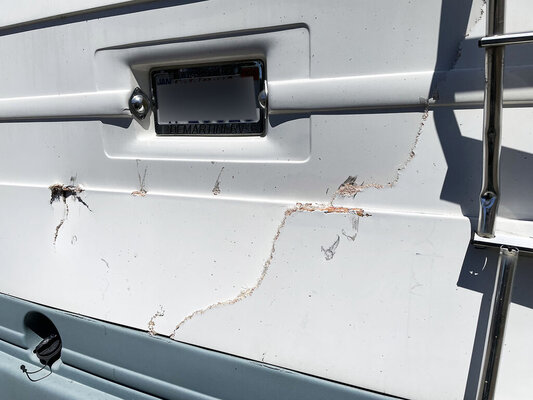You are using an out of date browser. It may not display this or other websites correctly.
You should upgrade or use an alternative browser.
You should upgrade or use an alternative browser.
Rear Fiberglass Cap Damage
- Thread starter zulu
- Start date
The friendliest place on the web for anyone with an RV or an interest in RVing!
If you have answers, please help by responding to the unanswered posts.
If you have answers, please help by responding to the unanswered posts.
Isaac-1
Well-known member
My guess is you can get that fixed for under $7,000 if you take it to Mexico
Skookum
Well-known member
- Joined
- Dec 19, 2018
- Posts
- 3,664
Wow! How did that happen? (I tow a Jeep also..)
I agree with the others who have posted so far…that’s several thousands of dollars worth of damage. If you put 20 hours on it at $100/hr, minimum 2k and I bet it’s more.
I agree with the others who have posted so far…that’s several thousands of dollars worth of damage. If you put 20 hours on it at $100/hr, minimum 2k and I bet it’s more.
Ranger smith
Well-known member
- Joined
- Feb 13, 2015
- Posts
- 74
Stupid Question . . . With a tow bar hooked to the jeep how does it manage to hit the back of the RV ??
Old_Crow
Well-known member
Not such a stupid question. I was expecting damage to one corner caused by cutting too sharp. The only way I can see this damage occurring is if the tow bar came disconnected and slid under the coach when he stopped.Stupid Question . . . With a tow bar hooked to the jeep how does it manage to hit the back of the RV ??
Mark_K5LXP
Well-known member
Note that the tow bar connection to the RV is a pivot, not a ball hitch. If the tow bars were not aligned so the RV end is higher than the toad end, during a hard stop the inertia will push the front of the toad up and it can hit the back of the RV. Note how high up the damage is. So it'd be my observation the tow bars weren't aligned properly.
"During a panic stop and with enough lift, the car could lose traction on the front wheels and possibly jackknife. In the event of a collision, the car could actually vault into the rear of the motorhome."
Tow Bar Forces And Alignment
Mark B.
Albuquerque, NM
"During a panic stop and with enough lift, the car could lose traction on the front wheels and possibly jackknife. In the event of a collision, the car could actually vault into the rear of the motorhome."
Tow Bar Forces And Alignment
Mark B.
Albuquerque, NM
Last edited:
Gary RV_Wizard
Site Team
I think Mark has it right. The toad was somewhat higher than the hitch pivot point, so the toad "climbed" in the hard stop, pivoting the tow bar upward and literally lifting the front of the toad off the pavement. Best practice for a tow bar is to have it dead-level or at slightly upward angle to the coach receiver. I prefer the up-angle, thus forcing the toad to dive under rather than climb. That helps keep the toad wheels in contact with the road.
The other thing this implies is inadequate toad braking in a hard stop. Many owners intentionally adjust the braking to be light and delayed relative to the coach, fearing brake drag on long downhill grades. That usually yields little or no braking in a panic stop.
The other thing this implies is inadequate toad braking in a hard stop. Many owners intentionally adjust the braking to be light and delayed relative to the coach, fearing brake drag on long downhill grades. That usually yields little or no braking in a panic stop.
Mark_K5LXP
Well-known member
I'm impressed that the RV had enough brakes to launch the toad unless the tow bar angle was so steep it didn't take a lot. This will be a spendy lesson. I understand that sourcing front and rear caps is very difficult so it will likely involve removal, fiberglass repair and repainting, plus whatever collateral damage that may be behind it.
Mark B.
Albuquerque, NM
Mark B.
Albuquerque, NM
Ksouers
Well-known member
I think Gary makes an important point, re: toad braking settings. It would appear that they are inadequate for the intended purpose, in particular during a panic stop when needed most.
Kevin
Kevin
Old_Crow
Well-known member
The one time I've hit the brakes on my coach hard enough for the ABS to kick in, I could definitely feel the Jeep brakes kick in. I use a solid tow bar with a conventional hitch ball mount, so didn't realize that the pivot style could do that. I've always heard that the tow bar should be level (mine is) but never really understood why until now.
Ray-IN
Well-known member
See my reply on irv2.com.
zulu
Well-known member
OP here.
Here is info on HOW the accident actually occurred and HOW we plan on repairing the damage. Thanks!
The Safari Solution
Here is info on HOW the accident actually occurred and HOW we plan on repairing the damage. Thanks!
The Safari Solution
Rene T
Site Team
I know you don’t want to make a insurance claim for fear it will not be covered. If it were me, I would at least contact them, explain what happened and see what the’ll do for you. You may be fully covered. I would not mention the dead battery unless they ask.OP here.
Here is info on HOW the accident actually occurred and HOW we plan on repairing the damage. Thanks!
The Safari Solution
I don’t know how insurances works so my next questions is for the experts.
If a adjuster comes out and declares it a total loss would I be required to continue with the claim or can I end it at anytime?
Old_Crow
Well-known member
Yeah, I'd at least contact the insurance. When the plumbing in my coach froze, I never thought to contact the insurance until one of my kids said something about me having full coverage. Ended up with the insurance paying over $9k to fix my plumbing. I'd also not mention the battery.
It's worth a shot and all they can say is "no".
It's worth a shot and all they can say is "no".
Mark_K5LXP
Well-known member
Shows that improbable scenarios can happen - no toad brakes, plus irregular road, plus hard stop. I can appreciate the fix method - this isn't a heirloom or collector item and the inherent cash value of a 2001 RV is small, so it doesn't make sense to buy it again or even more just to restore it as original. Make it "nice", functional and down the road you go.
Mark B.
Albuquerque, NM
Mark B.
Albuquerque, NM
zulu
Well-known member
You didn't read my whole post.I know you don’t want to make a insurance claim for fear it will not be covered. If it were me, I would at least contact them, explain what happened and see what the’ll do for you. You may be fully covered.
I don't care if I'm covered. I don't want my insurance rates to go up.
zulu
Well-known member
Yeah, I'd at least contact the insurance. When the plumbing in my coach froze, I never thought to contact the insurance until one of my kids said something about me having full coverage. Ended up with the insurance paying over $9k to fix my plumbing. I'd also not mention the battery.
It's worth a shot and all they can say is "no".
See Rene's reply.
Do you live up the road from Bishop on 395?
Old_Crow
Well-known member
Yes, I manage the campgrounds in Rock Creek Canyon, and I'm based at French Camp Campground April through October.
This winter I'll be headed back to Arkansas, but I'll be back out here again in April.
This winter I'll be headed back to Arkansas, but I'll be back out here again in April.
Gary RV_Wizard
Site Team
In theory you can withdraw the claim at any time, but in practice you won't know is is a "total" until you get the settlement offer. The adjuster might casually remark that it is likely a total, but it's not his call. It becomes official when the company offers settlement. You can refuse to accept the settlement, but the claim remains pending. And if there is a loan lien on the vehicle, the decision is not solely yours.If a adjuster comes out and declares it a total loss would I be required to continue with the claim or can I end it at anytime?
The more practical option is to accept the total loss settlement but buy the vehicle back from the insurer at its salvage value (and then fix it yourself). This is actually fairly common. The downside is that in many states the insurer will cause a salvage title to be issued by the state and that can result in limitations on what the owner can do (that varies by state).


